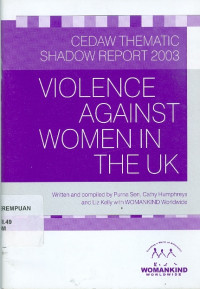
Text
Violence against women in the UK: CEDAW thematic shadow report 2003
The production of this document has involved wide consultation across the VAW sector, by email and at a consultation meeting held in London in May 2003, attended by 90 individuals and organisations.The report has been produced with WOMANKIND Worldwide, a UK-based charity ONG. The authors welcome the increased attention from government to the issue of violence against women and girls over the past four years. However, CEDAW Report argues that the UK is still not in compliance with the responsibilities of states as elaborated in the Beijing Platform for Action. The Report presents in the overall conclusions and insights that government is failing to meet standards of human rights protection and promotion with respect to women because of limited financial investment and lack of strategic infrastructure and oversight.Shadow Report Relation: Rainbo Rape and Sexual Abuse Centre, Merseyside Refugee Women’s Resource Project Say Women South Essex Rape and Incest Crisis Centre (SERICC) Southall Black Sisters Truth About Rape West Yorkshire Justice for Women Women Living Under Muslim Laws Women’s Aid Federation of England Women’s Design Service. The essence of the human rights agenda is the pursuit of human dignity: what this looks like and how it can be achieved. The human rights framework specifies what individuals should be able to do to achieve, maintain and protect that dignity and places on states the obligation to ensure that these rights are made real. Violence stands in contradiction to dignity as a violation in itself of those rights and, through its impact, is an impediment to the realisation of a significant number of rights. The framework also espouses a commitment to the elimination of discrimination against women and understands that violence against women is a cause and consequence of gender discrimination. Any state that claims a commitment to human rights must take seriously the eradication of violence against women. The UK government has promised to uphold and implement international law on the elimination of discrimination against women. Yet, despite a myriad of government initiatives that seek to address violence against women, the UK still fails adequately and coherently to tackle the problem. This report illustrates some of those shortcomings. The UK has a justified reputation for its thriving NGO sector and strong research culture on violence against women. These achievements, however, have been despite and not because of government engagement, which has remained reactive and limited, for over two decades. Scotland can claim to have been more strategic and has invested in basic services for women in recent years. The UK also has a history of pilots and experiments, the lessons from which are rarely rolled out nationally, and a professional culture in which implementation of national policies is patchy and un-coordinated. Most importantly, the UK policy context is one that suffers from disconnections: between forms of violence, with most resources and policy development being focused on domestic violence; and of all violence from gender equality. The authors of and signatories to this report welcome the increased attention from government to the issue of violence against women and girls over the last nine years, as reflected in the greater attention and space afforded to violence against women in the 2007 report to CEDAW. However, we argue that limited financial investment and a lack of strategic infrastructure and oversight mean that the UK is still not in compliance with the responsibilities of states as elaborated in CEDAW and the Beijing Platform for Action. A number of issues highlighted in the report have been recognised for well over five years. The UK government is consistently and knowingly failing to meet due diligence standards of human rights protection with respect to its female population
Availability
| KP.IV.000171 | KP.IV SEN c | My Library | Available |
Detail Information
- Series Title
-
-
- Call Number
-
KP.IV SEN c
- Publisher
- London : Womankind Worldwide., 2004
- Collation
-
40p. ; 21cm.
- Language
-
English
- ISBN/ISSN
-
-
- Classification
-
KP.IV
- Content Type
-
-
- Media Type
-
-
- Carrier Type
-
-
- Edition
-
-
- Subject(s)
- Specific Detail Info
-
-
- Statement of Responsibility
-
-
Other version/related
No other version available
File Attachment
Comments
You must be logged in to post a comment
 Computer Science, Information & General Works
Computer Science, Information & General Works  Philosophy & Psychology
Philosophy & Psychology  Religion
Religion  Social Sciences
Social Sciences  Language
Language  Pure Science
Pure Science  Applied Sciences
Applied Sciences  Art & Recreation
Art & Recreation  Literature
Literature  History & Geography
History & Geography